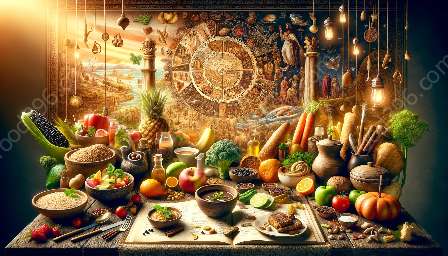The early modern period witnessed the emergence and evolution of vegetarian and vegan movements, laying the foundation for the development of vegan cuisine. This historical exploration will delve into the cultural, social, and culinary impact of these movements, and their significance in the broader context of cuisine history.
Vegetarianism in Early Modern Times
In the early modern era, the concept of vegetarianism began to gain prominence as a philosophical and ethical stance. Influential figures such as Leonardo da Vinci and Sir Isaac Newton promoted vegetarian diets, emphasizing compassion for animals and the principles of natural living. The philosophical underpinnings of vegetarianism during this period were closely linked to the burgeoning scientific and intellectual developments, with advocates seeking to align their dietary choices with their broader worldview.
The early modern vegetarian movement also intersected with religious and spiritual beliefs, as evidenced by the influence of Hindu and Buddhist traditions on Western thinkers. The translation and dissemination of ancient texts, such as the Bhagavad Gita and the teachings of Pythagoras, contributed to the popularization of vegetarianism as a moral and spiritual practice.
The Emergence of Veganism
While vegetarianism gained traction, the specific concept of veganism, abstaining from all animal products, emerged as a distinct movement during the early modern period. The term 'vegan' was coined in the 1940s, but the ideals and practices underlying veganism have roots in earlier centuries.
The early modern vegan movement was characterized by a commitment to ethical and environmental concerns, predating the contemporary discourse on animal welfare and sustainability. Advocates of veganism challenged the prevailing notion of non-human animals as mere resources, advocating for a more compassionate and harmonious relationship with the natural world.
Cultural and Culinary Impact
The rise of vegetarian and vegan movements in the early modern era left a lasting impact on culinary practices and food culture. Vegetarian and vegan diets prompted the exploration of alternative sources of nutrition and culinary creativity, leading to the development of plant-based recipes and cooking techniques.
As vegetarian and vegan philosophies gained traction, they influenced the availability and variety of plant-based ingredients in local markets and households. The culinary traditions of different cultures were reimagined and adapted to accommodate vegetarian and vegan dietary preferences, resulting in the evolution of diverse and flavorful cuisines.
The early modern period also saw the proliferation of vegetarian and vegan cookbooks, which played a crucial role in documenting and disseminating plant-based recipes. These cookbooks reflected the evolving culinary landscape and served as valuable resources for individuals seeking to embrace vegetarian and vegan lifestyles.
Vegan Cuisine History
The historical intersection of vegetarian and vegan movements with cuisine history has shaped the evolution of vegan cuisine. Vegan cuisine history encompasses the adaptation of traditional culinary practices to align with the principles of veganism, emphasizing the use of plant-based ingredients and innovative cooking methods.
Exploring vegan cuisine history offers valuable insights into the cultural exchange and innovation that have enriched plant-based food traditions across different regions and periods. The incorporation of exotic spices, indigenous produce, and culinary techniques has contributed to the global diversity of vegan cuisine.
Continuing Influence
The early modern vegetarian and vegan movements continue to exert influence on contemporary dietary choices and culinary trends. The ethical and environmental considerations that underpinned these movements remain pertinent in the context of sustainability and conscious consumption. The legacy of early modern vegetarianism and veganism can be observed in the growing popularity of plant-based diets and the increasing availability of vegan options in the food industry.
By understanding the historical roots of vegetarian and vegan movements in the early modern era, we can appreciate the enduring cultural significance and enduring impact of these philosophies on cuisine history. The exploration of vegan cuisine history provides a lens through which to view the evolution of culinary practices and the creative ingenuity that has shaped vegan culinary traditions.

